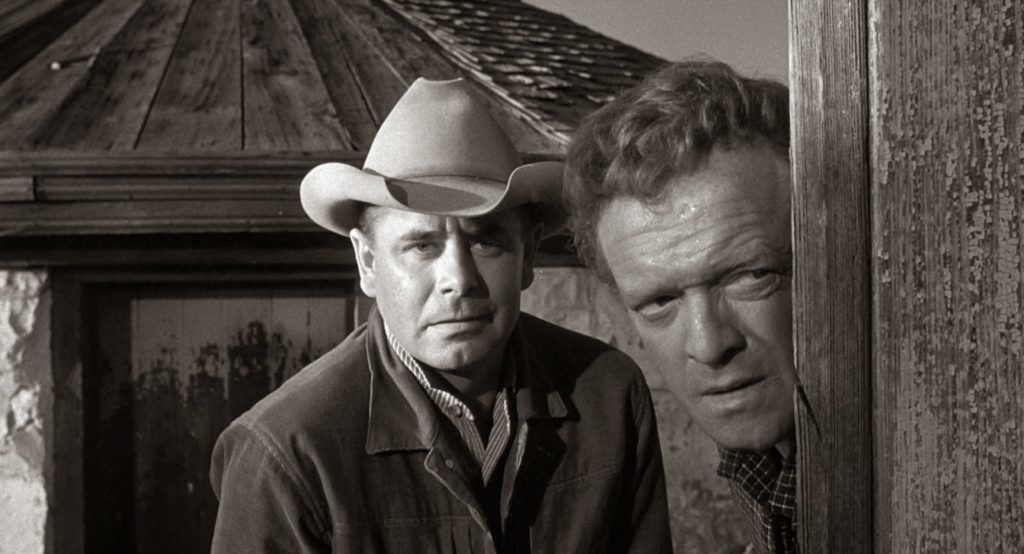3:10 to Yuma (1957)

Dan Evans (Heflin) is a struggling, drought-stricken rancher desperate for money who agrees to help escort Ben Wade (Ford), the leader of a band of outlaws, at gunpoint to take the train to Yuma where, presumably, he will go to trial. While in custody, Wade offers Evans several ways out, including a sizable payoff that would keep him and his family set for life. Evans faces a moral dilemma, as the chance of Wade ever making it to the train seems to be dwindling as the time inches forward to the deadline. While everyone bails out and risking almost certain death, Evans must choose between doing what he feels is right and doing what he thinks is best for himself and his family.
Another film under the shadow of High Noon’s enormous influence, and one of the best, 3:10 to Yuma has a relatively simple premise but remains wholly immersive due to its concentration on the characters, especially in the psychological mind-games that a crafty outlaw plays on those around him to try to secure his release. The feeling of utter helplessness for law-abiding citizens, when confronted with unscrupulously bad men, is all-encompassing, as we wonder if Evans will compromise his virtues and sense of duty when everyone, including the man who initiates the transfer, wants out of the deal.
3:10 to Yuma benefits from good characterizations, with an especially charismatic performance by Ford, who seems so reasonable at times, you’re never quite sure if he’s sincere or merely scheming another trick to wiggle his way out of a tight situation. You wonder if, when given a chance, he will kill Evans, or show some mercy for not being a bad guy. Still, given how expendable he thinks of his men (he kills one of them to ensure his escape), we feel in the back of our minds, his sense of decency is merely exhibited out of convenience.
I didn’t quite understand why Wade’s gang doesn’t just wait for him to get on the train, as it would seem much more straightforward to either get him to jump off at some point or to attack it and get it to stop. There are several such moments where I wondered why they weren’t more aggressive about saving their man, particularly in a finale where they employ a strange strategy of trying to pick him off from a sizable distance (if you’re going to endanger the life of your boss by taking potshots, why not just rush they guy?). The strengths of the film lie in the psychological drama, and not in the plausibility of the events, so to properly enjoy the movie, you have to accept that once Wade sets foot on the train, his life as a bandit is over.
The lead actors are fine, though some of the supporting characters can be a bit hammy, especially the kids, who exhibit that “golly gee swell” sense of youth so typical of 1950s entertainment. A love interest for Wade crops up out of nowhere when he seduces a barmaid, which seems somewhat superfluous to the overall piece (perhaps to get us not to portray Wade as without charm, maybe to try to explain why he’d screw up and stick around too long). Still, the film never loses its entertainment value.
Ultimately, the film celebrates the virtues of men who stand up for what they believe in regardless of saving their skin — a cause worth fighting for is also a cause worth dying for. It’s not the flashiest or grittiest Western around, but it does make you think, which, in a genre glutted with so much formulaic fare, makes it stand out in a very dense crowd.
Qwipster’s rating: A-
MPAA Rated: Not rated, but would probably be PG for violence
Running time: 92 min.
Cast: Glenn Ford, Van Heflin, Leora Dana, Robert Emhardt, Henry Jones, Felicia Farr, Richard Jaeckel
Director: Delmer Daves
Screenplay: Halsted Welles (based on a story by Elmore Leonard)
